Mindful Eating and Weight Loss might sound like just another wellness trend, but imagine this: you’ve tried countless diets, cut out your favorite foods, and followed strict rules, yet the weight keeps coming back.
It’s exhausting, right? You feel stuck in a cycle of guilt, frustration, and self-criticism. But what if there was a different way a kinder, more gentle approach that didn’t involve depriving yourself? What if losing weight was less about what you eat and more about how you eat? By practicing mindful eating, you can finally break free from the struggle, savor your meals, and create a healthy relationship with food, all while shedding those extra pounds naturally.
What is Mindful Eating?
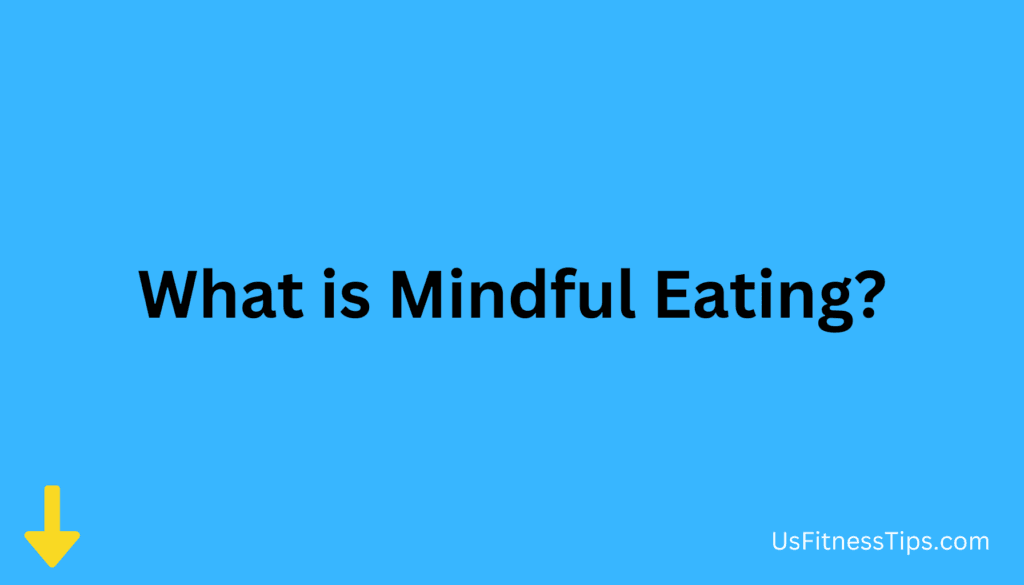
Mindful eating is a simple but powerful practice that involves being fully present during your meals. It’s about slowing down, paying attention to your food, and noticing the flavors, textures, and sensations. Think of it as a form of meditation that you can do while eating.
Instead of eating on autopilot (we’ve all been there, eating chips while watching TV), mindful eating is about being aware. You notice your hunger, your fullness, and your emotions tied to food. This way, you make better choices and stop when you’re satisfied, not stuffed. It’s rooted in mindfulness, a practice from Buddhism, but you don’t need to be spiritual to practice it. Anyone can do it!
The Connection Between Mindful Eating and Weight Loss
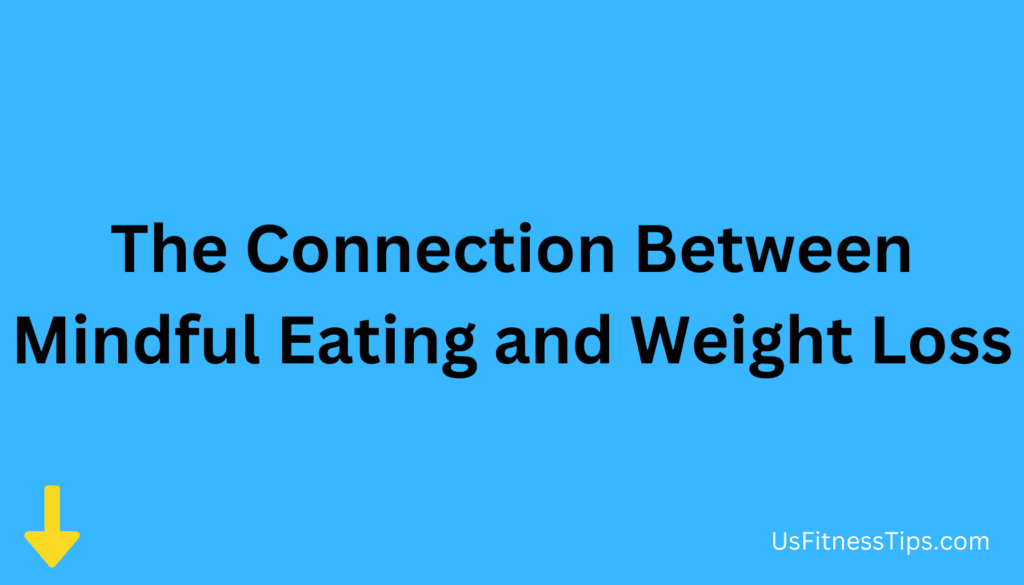
So, how does mindful eating help with weight loss? It’s pretty straightforward. When you eat mindfully, you tune into your body’s hunger cues. You know when you’re hungry, and more importantly, you know when you’re full. This reduces overeating, which is one of the biggest causes of weight gain.
There’s also science to back this up. When you eat mindfully, you help regulate hormones like ghrelin (which makes you feel hungry) and leptin (which makes you feel full). Mindful eating helps keep these hormones balanced, so you’re less likely to eat out of boredom or stress.
Plus, when you pay attention to your food, you enjoy it more. This means you’re more satisfied with smaller portions, making it easier to lose weight without feeling deprived.
Benefits of Mindful Eating for Weight Loss
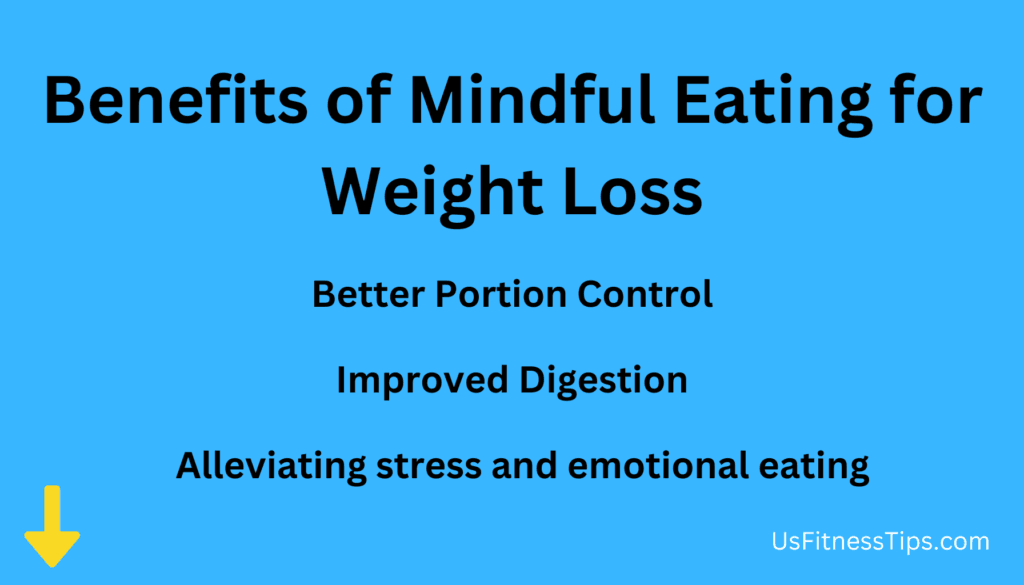
- Better Portion Control: One of the biggest perks of mindful eating is better portion control. Instead of mindlessly finishing everything on your plate, you pause and check in with your body. Are you still hungry, or are you just eating because there’s food left? This straightforward practice of self-awareness helps curb overeating.
- Improved Digestion: When you eat slowly and mindfully, your body has time to properly digest food. You chew your food thoroughly, which is the first step in good digestion. This helps your body absorb nutrients better, which can aid in weight loss and overall health.
- Alleviating stress and emotional eating: which often leads us to indulge when feeling anxious, sad, or bored, we can remove a significant hurdle in our weight loss journey. By practicing mindful eating, you become more aware of your emotions and why you’re eating. Instead of grabbing a snack when you’re upset, you might take a moment to breathe, relax, and decide if you’re truly hungry.
How to Practice Mindful Eating: Step-by-Step Guide
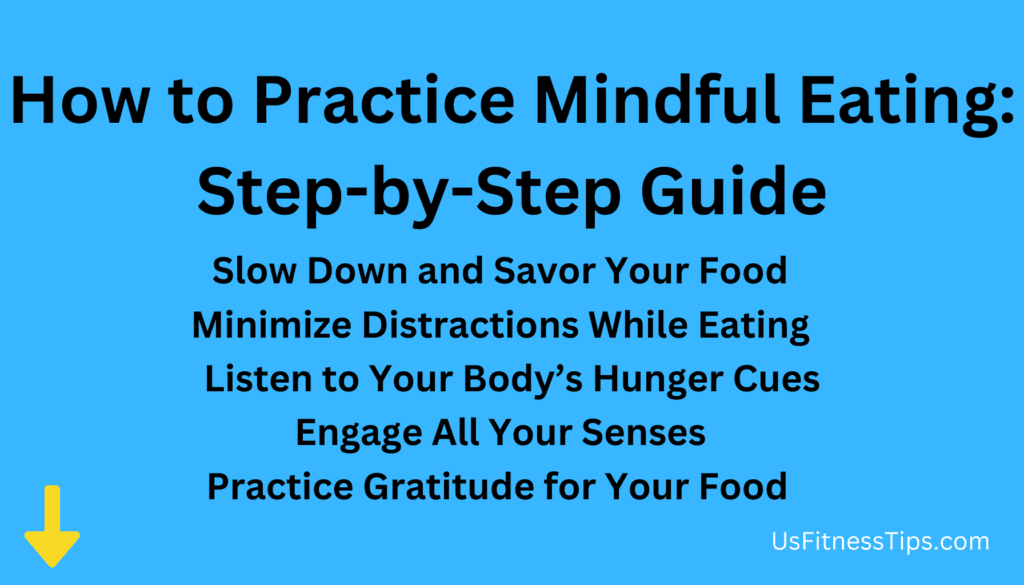
Ready to give mindful eating a try? Simple guide to help you get started:
- Slow Down and Savor Your Food: Take your time with each bite. Taste your food after having bite in your mouth. Notice the flavors, the textures, and the aroma. It might feel strange at first, but slowing down can help you feel more satisfied with less food.
- Minimize Distractions While Eating: Switch off the TV, set your phone aside, and concentrate on your meal.When you eat while distracted, you tend to eat more without realizing it. Eating without distractions helps you tune into your body’s signals and prevents overeating.
- Listen to Your Body’s Hunger Cues: Before you eat, ask yourself, “Am I actually hungry?” If the answer is yes, eat. If the answer is no, identify the reasons behind your urge to eat. Are you stressed, bored, or tired? Understanding your hunger cues is key to eating mindfully and losing weight.
- Engage All Your Senses: Eating mindfully isn’t just about taste. Use all your senses. Notice the colors of your food, the smell, the texture as you chew. This makes eating a more enjoyable experience and helps you feel satisfied faster.
- Practice Gratitude for Your Food: Take a moment before eating to appreciate your food. Think about where it came from and the effort it took to get it to your plate. This simple act of gratitude can help you slow down and eat more mindfully.
Mindful Eating vs. Dieting: Why It’s a Better Choice
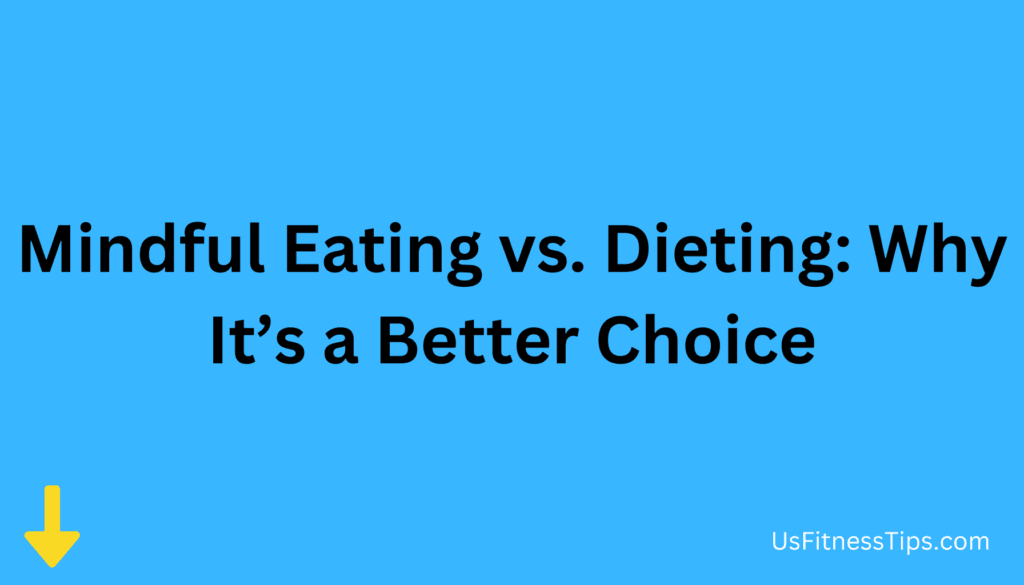
Unlike dieting, which often feels restrictive and unsustainable, mindful eating is all about freedom. You don’t have to follow strict rules or give up your favorite foods. Instead, you learn to enjoy your food more and eat in a way that feels good for your body.
Dieting frequently results in a pattern of limiting intake, overeating, and feeling guilty. Mindful eating breaks this cycle by helping you tune into your body’s needs. You eat when you’re hungry and stop when you’re full, making it a natural and healthy way to manage your weight.
Mindful Eating Tips for Busy Lifestyles
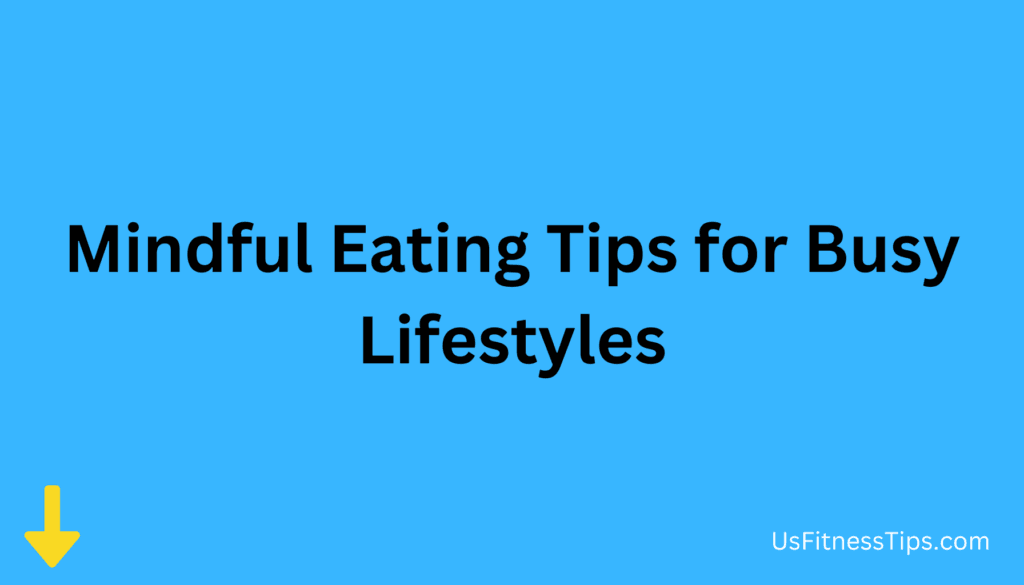
We get it life is busy, and sitting down for a slow, mindful meal isn’t always possible. Here are a few tips to practice mindful eating even on a hectic schedule:
- Try mindful snacking. When you grab a snack, take a moment to enjoy it instead of eating on the go.
- Make small changes, like turning off your phone during meals or taking a few deep breaths before you start eating.
- Even if you only have a few minutes, take time to notice your food and eat slowly.
Overcoming Typical Obstacles in Mindful Eating
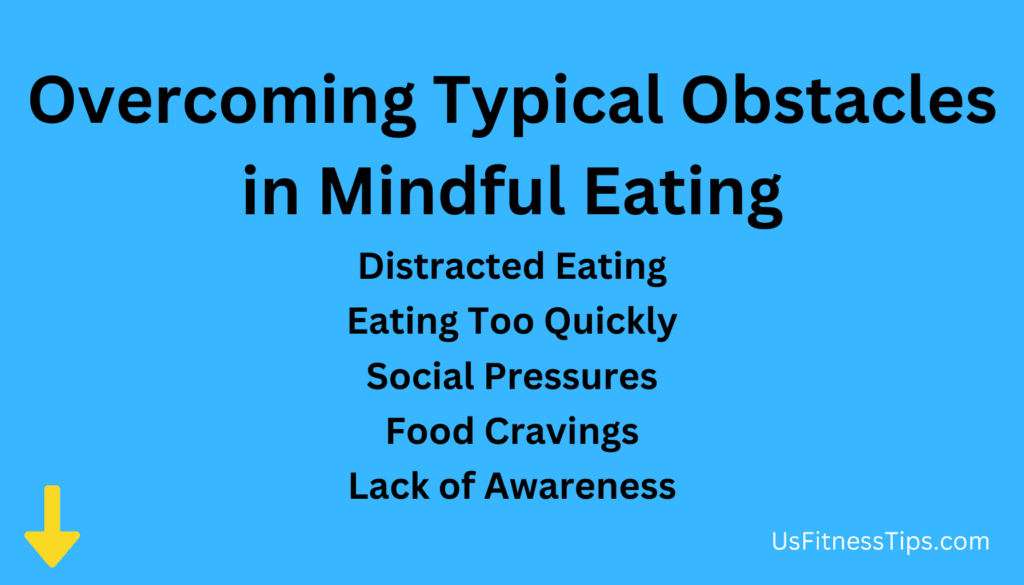
1. Distracted Eating
Challenge: It’s easy to eat while watching TV, checking your phone, or multitasking.
Solution: Create a dedicated eating space. Turn off distractions and focus solely on your meal to fully experience the flavors and textures of your food.
2. Eating Too Quickly
Challenge: Eating in a hurry can lead to overeating and poor digestion.
Solution: Practice slowing down. Put your fork down between bites, chew thoroughly, and savor each mouthful to give your body time to signal when it’s full.
3. Social Pressures
Challenge: Social situations often involve food, and it can be hard to stay mindful.
Solution: Plan ahead by deciding in advance how much you’ll eat. Engage in conversations and activities that don’t revolve around food to stay mindful during social gatherings.
4. Food Cravings
Challenge: Cravings for unhealthy foods can be hard to resist.
Solution: Keep healthy snacks on hand to curb cravings. Practice mindful indulgence—allow yourself to enjoy a small portion of a craving with full awareness and without guilt.
5. Lack of Awareness
Challenge: Being unaware of your eating habits can make mindful eating difficult.
Solution: Keep a food journal to track what you eat, how much, and how you feel during meals. Reflecting on your journal can help you identify patterns and areas for improvement.
credit:NewsChannel 5
Long-Term Weight Management with Mindful Eating
The key to making mindful eating a habit is consistency. It’s not about being perfect but about making small, mindful choices every day. Over time, these small changes add up and lead to lasting weight loss and better health.
Conclusion
Mindful eating is neither a diet nor a rapid solution. It’s a way of approaching food that helps you build a healthier relationship with eating. By tuning into your body’s signals and slowing down, you can lose weight naturally and feel more satisfied with your meals. Give it a try — your body and mind will thank you.
Frequently Asked Questions (FAQs)
Can I lose weight just by eating mindfully?
Yes, many people find that mindful eating helps them lose weight without the need for strict dieting.
How quickly can one observe the effects of mindful eating?
Results vary, but many people notice a difference in their eating habits and weight within a few weeks.
What should I do if I lack the time for mindful eating?
Start small. Even taking a few deep breaths before eating can make a big difference.




